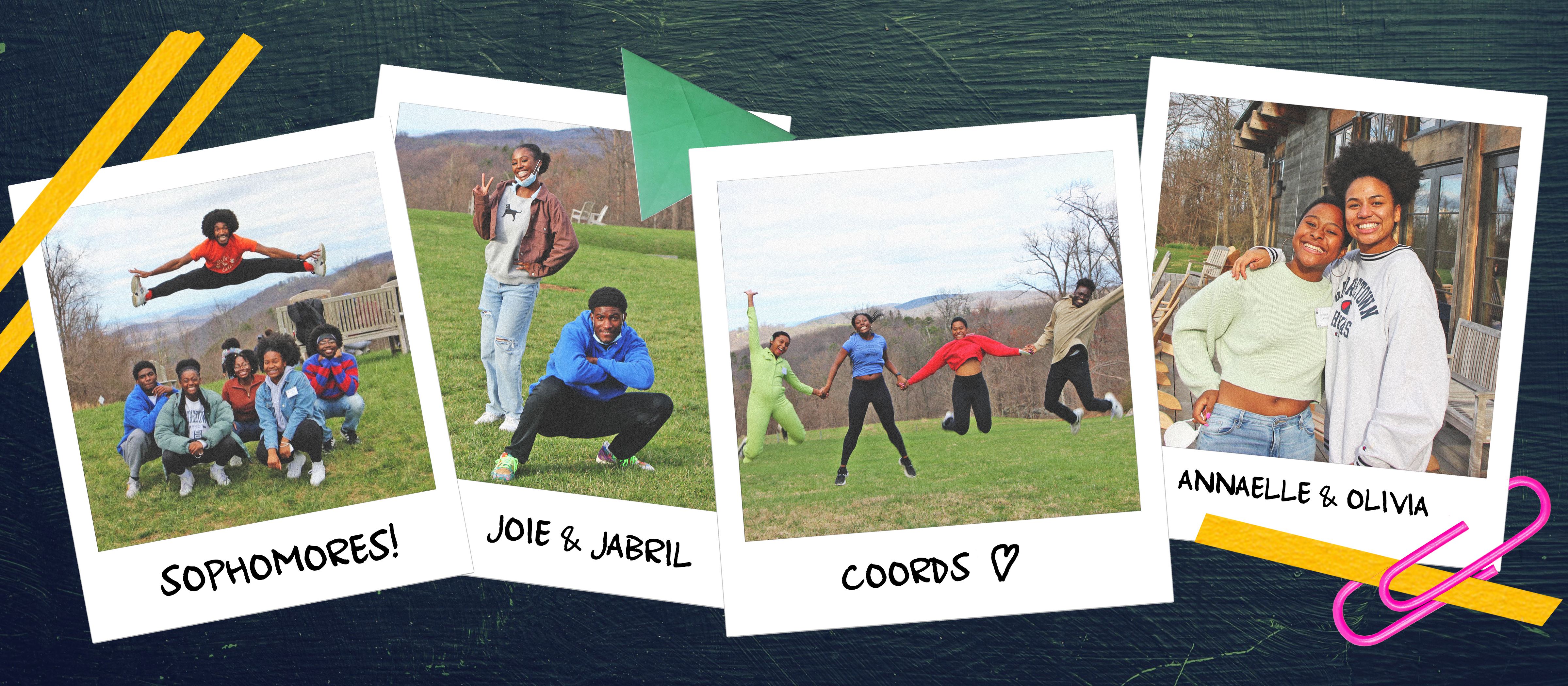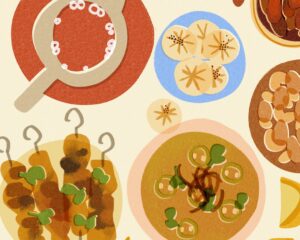Taking in the cool fall breeze during a brief moment of introspection at ESCAPE leader training last September, Kwabena Sekyere-Boateng (COL ’23) was struck by the thought: “What if we had a retreat for Black students?”
Excited by the prospect, Sekyere-Boateng brought the idea up to one of the ESCAPE leads, Veronica Williams (COL ’23), who was immediately onboard. Stepping back on campus, they started brainstorming—and the more they talked, the more they wanted to make this retreat a reality.
After months of exertion by its four coordinators, the April 9 ‘Cookout’ represented a dream coming to life. Marketed as “a retreat by Black students for Black students,” the Cookout brought together Black Hoyas at the Calcagnini Contemplative Center (CCC) for a weekend away from the turmoil of the Hilltop. Conducted in collaboration with Campus Ministry and in its first year, the inaugural retreat was promoted as an opportunity to reflect on shared experiences and fortify a sense of community among Black students at Georgetown.
“[We] decided what was the best way to execute our vision of creating a retreat that was a space for Black joy, hope, and just a space to kind of get away from campus but be in community with other Black people,” Williams said of the retreat’s vision.
Appreciating the restorative power of attending retreats, Williams said that the team of coordinators wanted a retreat format for the Cookout to foster a similar space of healing and reflection for their fellow Black Hoyas.
As Sekyere-Boateng and Williams fleshed out their idea, Saleema Ibrahim (SFS ’23) and Annaelle Lafontant (SFS ’23) joined the planning team. The team of four juniors worked tirelessly for months to bring the Cookout to life. In the initial stages, they mulled extensively over a name for the retreat that reflected the ideas of hope and family that they were trying to foster through this experience.
“As we were brainstorming, Veronica just said ‘The Cookout’ and we immediately knew that was it,” Sekyere-Boateng said, recounting one of the many planning sessions the coordinators had together. “The Cookout is a space for Black people; it fosters community. It’s a space where healing can happen.” He explained that cookouts occupy a significant place in Black culture because of their association with joy and fortifying bonds within a welcome, communal space.
The coordinators partnered with Campus Ministry, who facilitated much of the logistical and financial burden of organizing the retreat. Still, the relatively short turnaround time of making the Cookout a reality presented many hurdles.
Members of Campus Ministry, like Rev. Ebony Grisom, as well as other external supporters, like Maddie Kling, the ESCAPE coordinator, were extremely helpful in tackling the logistical and bureaucratic boundaries that arose during the planning process, according to Sekyere-Boateng.
“There were definitely portions of the planning process where we didn’t know if we were going to be able to proceed, especially because it’s a new event,” Ibrahim said, acknowledging challenges with the venue, COVID-19 concerns, and time constraints that could have pushed this first staging of the retreat to the fall.
Despite the challenges, Williams shared that the coordinators continued to push for their idea to be realized this semester because they knew how much it would mean for the Black community.
“We had to advocate for ourselves a lot and just really show that, yes, we do have the capacity to do this, we do have the skills to do this,” Williams said.
The team also expressed their gratitude for the overwhelming amount of support they received from students across campus as well. Following an initial announcement in late March, the retreat received overwhelming promotion from Black students across campus, being reposted across several platforms by both students and Black student organizations like BSA and The Blaxa. Ibrahim and her fellow coordinators wanted to get the input of other Black students and organizations to tailor the retreat to their community, and they were met with encouragement.
“It just showed that we’re not shouting into a void here, everyone wants the same thing and people are willing to help get you to that goal too,” Ibrahim said.
Part of making a space for the community entailed making the event financially accessible. “By making it free, it just removed one of those barriers of getting people to go,” Ibrahim said.
In her first year, Ibrahim said events like “Black to School week”—an orientation week sequence of mixers and parties hosted by different parts of Black Georgetown at the beginning of the year—and other community-building opportunities really helped her feel welcomed within a primarily white institution (PWI) like Georgetown. But Black to School week didn’t occur in 2021—perhaps another pandemic casualty. Accordingly, Ibrahim believes the Black community at Georgetown does not feel as closely knit now, which she attributed in part to the impact of the pandemic on maintaining social bonds and community, especially across year groups.
“All four of us have had a lot of discussions about the state of Black Georgetown in general and how the pandemic itself really fractured the social bonds that I knew my freshman fall,” Ibrahim said. “It created a vacuum where I feel like there weren’t spaces, or community building areas for first-years and other underclassmen to be in community with each other.”
The coordinators also hoped that the retreat would serve as an opportunity for bonding between class years lost since the beginning of lockdown in spring 2020.
“We want this to be a space that is bridging together gaps, people of different class years, a space for love, a space for community,” Lafontant said.
Centering comfort and joy was especially important to the coordinators, though Sekyere-Boateng acknowledged trauma is difficult to avoid as a subject matter for students at a PWI.
“We didn’t want it to be a trauma bonding space, we wanted to stray away from that. We really wanted it to be a joyous space,” Sekyere-Boateng said. “We wanted to create another space that just allowed for Black people to be in community with each other.”
As a space oriented by and specifically for Black students, the Cookout presented a unique opportunity for Black Hoyas to reflect on the myriad experiences Black students have without their Blackness being contrasted against whiteness—something Sekyere-Boateng said can be an unfortunate and common feature of reflective spaces on campus. He explained that reflective spaces on campus often limit Black Hoyas to thinking about their identities within the context of whiteness, but the retreat would allow them to reflect on their experiences within a shared community.
As the day of the retreat finally arrived, the coordinators had some worries about how the first iteration of the Cookout would transpire.
“All the things that could go wrong were running through our heads before,” Ibrahim said. She described feeling immediate relief upon arriving at the grounds of the CCC.
And, according to Ibrahim, all the coordinators’ worries went out the window as the Cookout successfully took place, far surpassing even their hopes for the retreat. Throughout the retreat, participants were able to strike the perfect balance between introspection and leisure. They engaged in small and large group discussions, some facilitated by guest speakers and Black community leaders, as well as more fun and casual activities like a music and dance session.
For many of the participants, it acted as the perfect opportunity to feel welcomed in a space that presented itself as entirely their own. Olivia Cooley (COL ’23) shared how welcoming the space felt, especially as an opportunity to connect with other Black Hoyas.
“It was a very kind and warm space,” Cooley said. “When I do have the opportunity to have a majority Black space, it’s very comforting.”
Senoh Koroma (MSB ’25), another attendee, felt a refreshing sense of belonging in opening up about her experiences and building community with other Black Hoyas throughout her time at the retreat.
“For the first time in the year that I’ve been here, I actually felt like a Hoya,” Koroma said.
She added that the small and large group discussions facilitated throughout the retreat helped foster this welcoming atmosphere that allowed her to feel comfortable in embracing and sharing her identity in its entirety.
“I felt a really strong sense of community where I didn’t really have to check how I spoke, check my hair, check the way I was perceived by certain people,” Koroma said. “I could just be comfortable and exist as myself without this gnawing doubt of how other people perceive me.”
While the retreat functioned as a reflective space, it also allowed its participants to just have fun. Arrielle Benjamin (MSB ’25) shared that she was able to really bond with other participants over music, s’mores, and games at the dance party the coordinators hosted on Saturday night.
“Most of these people I hadn’t really met before, but I felt really connected to everyone at that moment,” Benjamin said.
Though the Cookout lasted a little over a day, the coordinators attested to many of the bonds that they observed being formed throughout the retreat being maintained on campus now. Retreat participants have a group chat together, and routinely organize impromptu meet-ups amongst themselves like game nights and hangouts on Healy lawn.
One of the participants, Lisette Blackstone (COL ’25), emphasized how effective bond-building beyond the retreat has continued.“I feel like for a lot of events sometimes, you’re there for the events but the relationships don’t really carry on but I feel like with the retreat it’s been really different,” she said. “I feel like I’m actively part of a community.”
Blackstone felt that the Cookout helped reaffirm many facets of her Black identity. She further explained that the retreat really helped her to feel unapologetically comfortable in her identity.
“I learned that I don’t have to perform for anyone. I’m here, and I am who I am, and it’s okay to just be one hundred percent present as myself,” Blackstone said.
Blackstone also spoke about the pressure that comes with navigating a PWI as a Black student. She described many of her fellow Black Hoyas feeling like they had to constantly explain and justify their identities to the non-Black students around them, but the retreat helped them to overcome this pressure.
“I realized I don’t owe people an explanation, and if they don’t understand that, they have the same Google that I have,” Blackstone said. “That was really freeing for me because it relieved a lot of the pressure.”
Following this first iteration of the retreat, the Cookout coordinators are already looking ahead and envision a future retreat more reminiscent of its name, with more time, and more food. The coordinators also hope this year’s retreat sets a precedent for future Black spaces on campus. As many students continue to express their support for what the first Cookout meant to them, the coordinators felt they had accomplished their primary goal of implementing community and inspiring hope. Even for those unable to attend, the successful staging of the retreat marked a welcome change and opened up the floor for more spaces on campus where they could feel completely welcomed and celebrated.
“We really wanted to implement radical hope and I think we did that,” Sekyere-Boateng said. “We deserve spaces where we can just be happy.”
While they hope the Cookout will be a long-lasting part of the experience of Black students at Georgetown, the coordinators also shared that they were glad they helped in reestablishing and fortifying bonds between the Black community at Georgetown.
“Whatever the Cookout might look like in years, even if it just ends, I hope those sentiments that I felt there are still there,” Sekyere-Boateng said. “As long as those things that we were thinking about—and that were brought up there—are still present in the Black community, I’d be happy.”
For its organizers and participants, the Cookout marks a new beginning for Black Hoyas: a space for community and where Black joy is no longer a rarity, but a standard part of their experience on the Hilltop.
“I want this to become a staple in Black Georgetown,” Ibrahim said. “I want Black joy everywhere on this campus because that’s what we deserve.”






